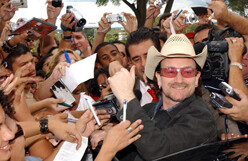Irish rocker Bono announced in January the launch of Product RED, a venture designed to raise money for the Global Fund to Fight AIDS, Tuberculosis and Malaria. The money comes from a portion of the profits earned by the sale of products from companies in the private sector. Since its launch, RED has become the new black. The Gap, Converse, Apple, Motorola, and Armani, partners in the Product RED initiative, have gathered a large group of celebrities for their advertising.
This celebrity-backed project is not only helping the fight against the world’s greatest health crises, but is also part of a new trend in world trade—ethical clothing—with implications for the textile industry in Africa and developing countries around the world.
January 1, 2005—one year before the launch of Product RED—was a pivotal moment for the World Trade Organization and textile producers everywhere. It marked the end of a 30-year quota system and was seen by many as a crucial step away from restrictive trade policies and toward the promise of trade liberalization. The Multi Fibre Arrangement, as the quota system was called, was put in place in 1974 as a means to protect textile industries in rich countries from the inflow of products from poor countries.
Ironically, this system, which was seen as unfair and discriminatory, had a positive effect in many poor countries. While it protected the industries of rich countries, it also guaranteed that textile industries in poor nations had access to European and U.S. markets.
Many poor countries became dependent on their textile industries, so when the Multi Fibre Arrangement was put to an end nearly two years ago, these countries were faced with open competition—much of which comes from China, whose textile industry is one of the most robust in the world.
Meanwhile, some multinational corporations with factories in Asia have been accused of maintaining sweatshops. The popularity of sweatshop-free, ethical clothing therefore comes at an important time in international trade. Countries that experienced downsizing in their textile industries can now participate in this growing phenomenon, as a means to gain an advantage over Chinese exports.
Companies are responding to the demand for no-sweat goods, and the manufacture of ethical clothing has gained popularity in developing countries. Product RED, backed by its group of commercial partners producing no-sweat, ethical products, is helping to revitalize the African textile industry, create jobs, and ensure good working conditions.
In Lesotho, the textile industry experienced a severe collapse after a wave of Chinese imports flooded the market. Now, with the demand for ethical clothing such as Bono’s Edun, Gap, Old Navy, and Levi’s Product RED clothing, the industry has experienced a complete turnaround.
These companies are a part of a growing trend that is helping to set higher standards for how clothes are made. The implications of this trend reach further than those of a passing fad. At the core of the ethical clothing movement is the call to protect human dignity in clothing factories throughout the world. There’s a lot more to ethical clothing than looking chic.
While the demand for ethically made clothing has increased significantly, the goals cannot be met instantaneously. As has been noted by the Ethical Trading Initiative and NGOs like Oxfam, the push for companies to sell ethically labeled products may simply lull consumers into "a false sense of security." Consumers hope to obtain that same guilt-free feeling when they purchase ethical clothing as when they buy fair-trade goods.
Although the fair-trade movement and ethical-clothing movement are based on the same fundamental ideals, the two have taken different approaches. The fair-trade movement is geared toward creating alternative niches for consumers in the market and focuses predominantly on the agricultural sector. Meanwhile, the ethical-clothing movement has focused on pressuring big brands and retailers to change their practices. Ethical trade works from the top down, but the complex nature of the garment industry makes it difficult to certify that labor practices meet international standards at every stage of the supply chain—from cotton growing to sewing, finishing, and packing.
Recently, the fair-trade approach has been used in the garment industry, but again at best it can only guarantee that the raw materials used have been produced under humane conditions. The certification of fair-trade clothing depends on evidence provided by the very companies that make the clothing. This lack of transparency provides little guarantee that claims of acceptable working conditions are indeed true.
Companies want to cash in on this lucrative trend, and some have begun slapping no-sweat labels on their products to meet consumer demand. Perhaps the most notable of these companies is American Apparel, a T-shirt manufacturer in Los Angeles that claims to sell sweatshop-free products. Yet the company’s claims have been called into question. Dov Charney, American Apparel’s senior partner, has admitted that the company’s "no-sweat" tags are a marketing strategy. Charney has also been accused of interfering with his employees' right to organize.
Consumers are generally unaware of the realities of the clothing they wear and may believe that anything bearing the fair-trade or no-sweat stamp is ethically made. While consumers are eager to purchase ethical clothing and become a part of this fashion trend, they need to watch out for impostors. In the case of ethical clothing, counterfeiting goes beyond branding and market share—these fakes can severely undermine the greater purpose of the movement.
The new ethical-clothing phenomenon is a complex work in progress. Ensuring the humane treatment of the world’s garment-industry workers is something that no single clothing company or celebrity can guarantee overnight.
![]() This article is licensed under a Creative Commons License.
This article is licensed under a Creative Commons License.
Please read our usage policy.




